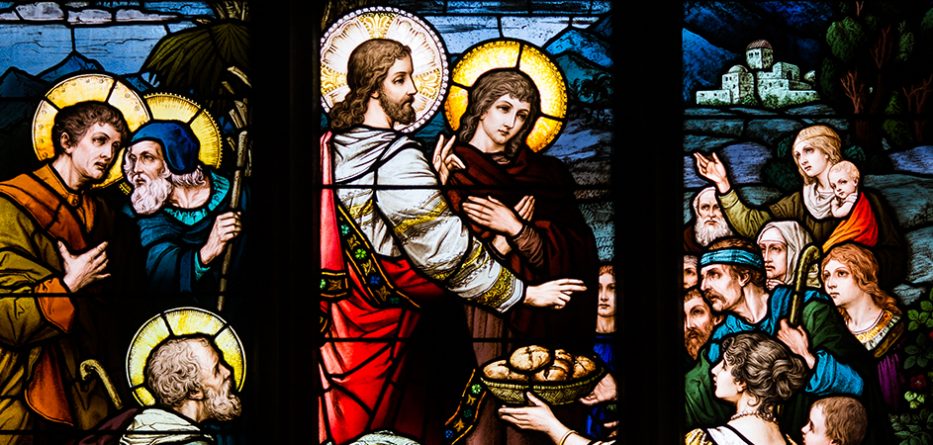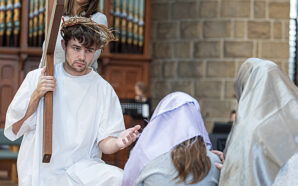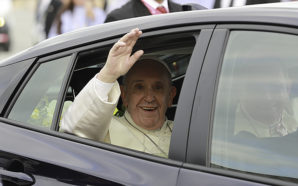Homily for the Eighteenth Sunday in Ordinary Time
Readings: Isaiah 55:1-3; Psalm 144 (145): 8-9, 15-18; Romans 8:35-39; Matthew 14:13-21
2 August 2020
In today’s gospel, we hear the story of Jesus feeding the 5,000. Variants of this story appear in all four gospels. It was a story which resonated with all early Christian communities whether Jewish or Gentile. There is a eucharistic motif in each account. In John’s gospel, the author had no need of a eucharistic institution narrative at the last supper. Enough was evoked by his story of the feeding of the crowd. Today’s account is from Matthew describing Jesus who takes the five loaves and two fish, raises his eyes to heaven, says the blessing, and breaks the bread. For us, as for the first listeners of this gospel, the eucharistic overtones are strong and clear.
LISTEN: https://soundcloud.com/frank-brennan-6/homily-2820
Jesus and the disciples are terrified. John the Baptist has been decapitated. They want to get away to a lonely place for some peace and quiet, some security and reassurance. The crowds follow them. Jesus does not chase them away, neither does he elude them. He takes pity on them and heals the sick.
When evening came, the disciples are keen to invoke the self-help clause, getting the market to do the work, providing food for the hungry. These people in their vast numbers are not their responsibility. The disciples urge Jesus to send the people away “to the villages to buy themselves some food”. We hear plenty of that down to earth, practical talk during this time of pandemic. Jesus takes a different approach. He asks the disciples to bring whatever they’ve got. Making do with that, he blesses the five loaves and two fish and provides for all. The catch is that the disciples have to hand over what little they have, all they have. It’s not a matter of keeping a fish and a couple of loaves for themselves so that they might be satisfied once the crowd has dispersed.
In John’s gospel, the loaves and fish are presented by a young boy. Some years ago I was at the Nauiyu Nambiyu Aboriginal community at the Daly River in the Northern Territory. A local artist showed me her traditional painting of this scene featuring a series of dots in concentric circles centred on a large red dot which I presumed to be Jesus, and perhaps even the Sacred Heart. She told me, “No, Father. That’s the little boy with the loaves and fish.” Each of us can imagine ourselves as the child in the centre of the painting, presenting what little we have, but presenting all that we have, so that it might be blessed and shared by the community bringing life and hope.
In a time of pandemic, our willingness to give our all is the first grace, and the precondition for the eucharistic meeting of the needs of so many. In the face of huge demands and needs, we find ourselves like the listeners to the prophet Isaiah in the first reading: “Oh, come to the water all you who are thirsty; though you have no money, come! Buy corn without money, and eat, and, at no cost, wine and milk.”
During this week, we celebrate the feast of our first Australian canonised saint Mary MacKillop. One of her favourite sayings to her Josephite sisters was “Never see a need without doing something about it.”
When she first took her sisters to Queensland in 1870, she ran into big trouble with the all-powerful clergy. The worldly-wise priests insisted that the sisters should accept the government grants available for setting up and running schools. But it was contrary to the Josephite Rule for the sisters to accept government funds or government direction. Mary wrote with ‘indescribable pain’ on 27 March 1870:
“My position as Guardian of our Holy Rule enforces this and in the presence of God, I must say what the voice of conscience and duty dictate. It is impossible for us to become in any way connected with Government and be true to the spirit as well as the letter of our Rule.”
She was not opposed to other sisters or church organisations receiving government funds. She wrote to her own sisters saying, “There is no reason why other Catholic teachers, or even Religious Communities, may not have their schools under Government where the bishop wishes it. Not for one moment do we think there is, but when it is against our Rule and its spirit there is every reason in our case.” The Vicar General in Brisbane was furious when he learnt that Mary was adamantly refusing to accept any government assistance. He “accused her of being self-willed and obstinate in holding out against learned enlightened superiors” like himself. We now live in a very different age. I daresay that there is hardly a single church school, health facility or welfare agency which could survive without government grants. But I also daresay that post-COVID-19 and the recession or depression we will endure, the wellbeing of our society will be gravely imperilled if we rely only on government hand-outs or if everything we do for others not our own has to be subject to government approval. There must be a place for the five loaves and two fish. Without them, we will have the community going hungry.
In the face of rising unemployment and in the wake of declining church attendance, we will need to assess how we can best contribute to the rebuilding of our society and to the care for the poorest and most marginalised without always seeking the government grant, subsidy or approval. We can be inspired by those like Mary MacKillop and her sisters in earlier times who went to the frontiers and who provided health, education and welfare services on the smell of an oily rag. At her canonisation ten years ago, Cardinal Pell said this of Mary when preaching at St Paul Outside the Walls in Rome: “We are grateful that she was not eccentric, not religiously exotic. We warm to her advice, are encouraged by her perseverance in sickness and adversity. Her faith and moral goodness are heroic, but not in a way which is off-putting or surreal. She does not deter us from struggling to follow her.”
Mind you, even Mary MacKillop would find it difficult in 2020 to win broad community acceptance for the provision of services not compliant with government regulations and the contemporary secular ethos of the Australian public square. At the time of her canonisation, Leader of the Opposition Tony Abbott told Parliament: “In an era when the church and its representatives are often thought to have failed people, her canonisation is a timely reminder of the good that has been done in this country and elsewhere under the influence of Christian faith”.
Prime Minister Paul Keating was right when he told Parliament back in 1995 at the time of Mary’s beatification:
“I trust honourable members will understand what I mean when I say that the beatification of Mother Mary MacKillop rings with significance for all Australians. The qualities she embodied—openness and tolerance, courage, persistence, faith and care for others—are qualities for individuals, communities and nations to live by. The Josephites continue to practice those virtues in their work for the poor in Australia and New Zealand, and increasingly in countries of the Third World.
“I think all honourable members will agree that we will serve Australia well, and future generations of Australians well, if we allow the values which inspired and guided Mary MacKillop’s work to inspire and guide our own. There is nothing to be gained from pretending that religious faith and the place of the church in our communities have not declined since Mary MacKillop’s day, yet the message of her life easily translates to our much more sceptical and secular society. It would, I think, bring a blessing on Australia, on future generations, if as a result of the beatification of Mary MacKillop that message spread.”
These sentiments are even more true today, a quarter-century later during a once in a century pandemic. With the ageing and diminishment of religious groups like the Josephites, the challenge goes out to all Australians, especially the young: “Never see a need without doing something about it.”
Let’s pray in this Eucharist that in the age of the pandemic, we might have the generosity of spirit to bring our few loaves and fishes to the table of the Lord, and that we might enjoy the Lord’s blessing so that we might be able to help those devastated by the medical, economic and social effects of the pandemic, feeding them as much as they want and collecting the scraps remaining, twelve baskets full. Whatever confronts us in the weeks ahead, especially here in Victoria, we are certain that nothing that exists, nothing still to come, “can ever come between us and the love of God made visible in Christ Jesus Our Lord.”
Fr Frank Brennan SJ is the Rector of Newman College, Melbourne and the former CEO of Catholic Social Services Australia (CSSA).








